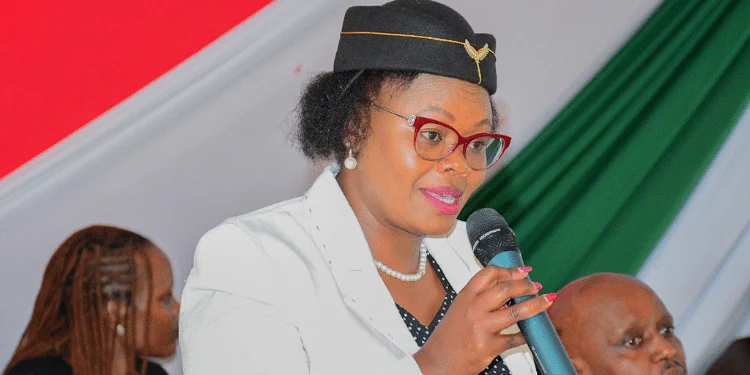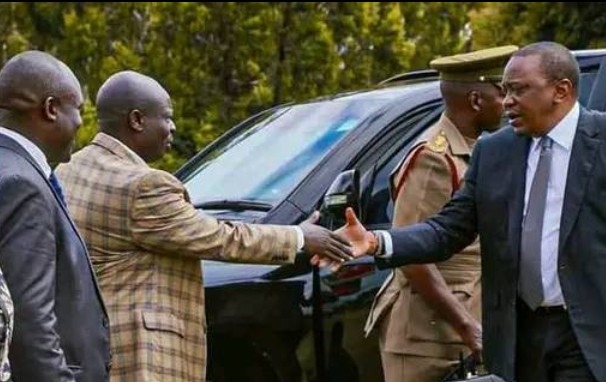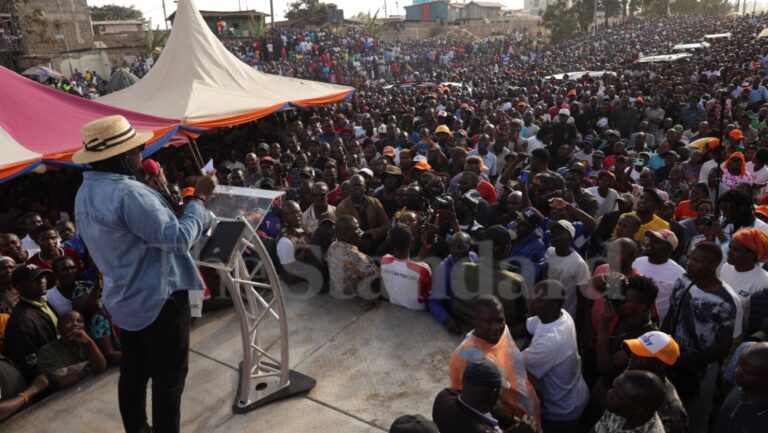
President William Ruto's aide, Farouk Kibet and Dennis Itumbi. Photo. Handout.
By Wanderi Kamau
Fresh revelations by former Deputy President Rigathi Gachagua have thrown the spotlight on two little-known but immensely powerful men at the heart of President William Ruto’s administration—Farouk Kibet and Dennis Itumbi.
Speaking during a hard-hitting interview with KTN News on Monday 7 April, 2025, night, Gachagua painted the portrait of a presidency steered not only from formal offices of power, but also by men behind the scenes who, he claims, often call the shots in government.
“Kibet is like a co-president. He is not a small man,” Gachagua said, his tone betraying both frustration and familiarity.
The man he was referring to—Farouk Kibet—is Ruto’s long-serving Personal Assistant, widely regarded as the gatekeeper to the Head of State. But according to Gachagua, Farouk’s influence runs far deeper than the PA title suggests. His counterpart in power, Itumbi, is also no stranger to the political arena, having transitioned from State House blogger under President Uhuru Kenyatta to Ruto’s trusted digital strategist and, more recently, presidential aide.
“You can see the things he was writing about me,” Gachagua said of Itumbi. “He is the chief propagandist for William Ruto. Itumbi and Farouk Kibet run the government of William Ruto.”
The remarks—delivered with unusual candour—have sparked new conversations about who really wields influence in the Kenya Kwanza administration.
The power of proximity
Kibet has long been viewed as one of the most powerful men in Ruto’s orbit. Though he has never held elective office, his political history with the President dates back to their days in the United Republican Party (URP). Insiders say no visitor sees Ruto without first going through Farouk.
“Farouk is not just a personal assistant. He is the President’s confidant, fixer, and sometimes enforcer,” says political analyst Javas Bigambo. “In politics, access is everything—and Farouk controls access.”
Read more:Natembeya, Farouk political war gets sour
Despite his low public profile, Farouk has often been linked to internal government turf wars. Last year, whispers emerged that he was frustrating Deputy President Kithure Kindiki, though he dismissed the claims as “baseless.”
Still, Gachagua’s comments appear to validate long-held beliefs about Farouk’s central role in shaping political outcomes within the administration.
Itumbi: From blogger to policy gatekeeper
Itumbi’s story is even more dramatic. Once a staunch defender of the Jubilee government, he was unceremoniously kicked out of the Presidential Strategic Communications Unit (PSCU) during the Uhuru era. But his fall from grace proved temporary.
Aligning with Ruto, Itumbi found new purpose as the digital voice of the “hustler nation.” His aggressive social media campaigns played a key role in shaping narratives and rallying youthful support ahead of the 2022 elections.
“Itumbi has mastered the art of digital warfare,” says governance expert Mark Bichachi. “He understands how to control the tempo of public discourse, and he uses that to defend Ruto’s administration with precision.”
Now serving as Head of Creative Economy and Special Projects in the Office of the President, Itumbi’s influence appears to go far beyond crafting press statements or running social media handles.
“All these statements you see issued by ministers, DCI—like the one issued about an attack at Mwiki church—it is Dennis who crafts them. You can even see his language,” Gachagua alleged.
In what was perhaps the most startling anecdote, Gachagua recounted how Itumbi once interrupted a high-level meeting between himself and the President during a heated discussion on the Affordable Housing Bill.
“If you have a meeting with the president and he does not like how it is going, he sends Dennis a text,” he said. “Dennis walks in and says, ‘Mr President, you are late for the next meeting,’ and the meeting ends.”
Questions of accountability
The former Deputy President’s revelations have raised serious concerns about how power is exercised at the highest level of government—and by whom.
“Kenya has always had influential men behind the throne,” says political historian Mercy Mwangangi. “But what we’re seeing now is a more institutionalised form of shadow governance, where proximity to power outweighs official mandates.”
Indeed, while the Constitution outlines clear roles for elected and appointed officials, the presence of parallel influencers like Farouk and Itumbi complicates the question of accountability. Neither of them is answerable to Parliament, yet they reportedly influence critical decisions.
Read more:Gachagua: Farouk Kibet is a ‘co-president’ in Ruto regime
For Gachagua, the sidelining is personal—but the implications are national. His public distancing from Ruto’s inner sanctum reflects deeper fissures within Kenya Kwanza, at a time when the administration is grappling with economic pressure, public discontent, and a growing rebellion within its ranks.
The real decision-makers?
As Ruto continues to consolidate his grip on power, the roles played by Farouk and Itumbi are unlikely to diminish. On the contrary, analysts say their importance may grow as the President heads toward the mid-point of his term.
“Whether you agree with their methods or not, Farouk and Itumbi are indispensable to Ruto’s political machine,” says Bigambo. “But the danger is when unelected figures start to override institutional governance. That’s where democracy begins to erode.”
Read more:Gachagua: Ruto the ‘greatest existential threat’ to Kenya
For now, the spotlight remains fixed on the President’s inner circle. And as the power struggle continues to unfold in public, Kenyans may soon be forced to reckon with a hard truth: the men with the most power in government may not always be the ones we elect.



